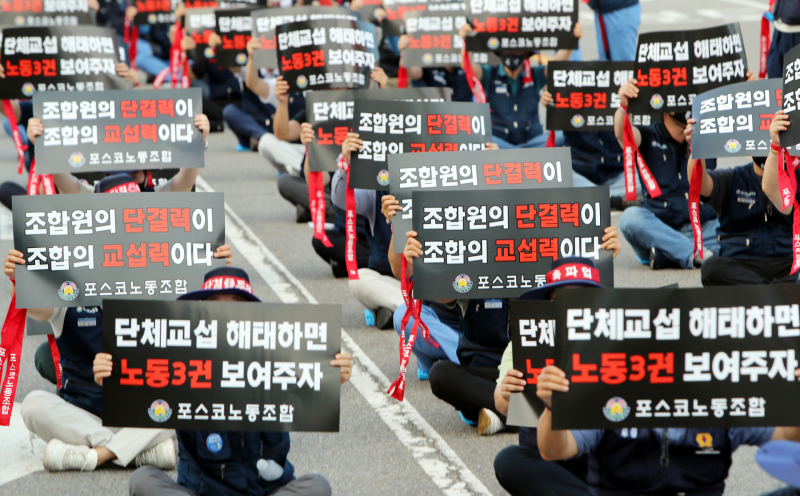
South Korean steel giant Posco faces the threat of a strike -- the first in its 55 years of history -- after months of wage talks between management and the company's labor union failed to reach an agreement.
In a vote held over the weekend, nearly 80 percent of Posco's unionized workers voted in favor of a strike, marking the first time a Posco union has approved a strike since the firm’s establishment in 1968.
Of the 11,145 union members, 10,756 people, or 96.51 percent, participated in the vote held Saturday and Sunday. The approval rate for the strike stood at 77.79 percent.
Wage freeze issues lie at the core of the dispute. According to the union, salaries have barely budged over the past three years, rising only 2 percent in 2019 and 2.5 percent in 2021, with a freeze in 2020.
As such, the union is pushing for a 13.1 percent hike in base salaries, an allotment of 100 shares of treasury stock per member, a revamp of the performance incentive system and increased lunch subsidies.
Posco, on the other hand, finds these demands financially unsustainable. The company claims that fulfilling the union's proposals would cost around 1.6 trillion won ($1.18 billion), roughly equivalent to 95 million won per employee.
In its counterproposal, Posco has offered an average wage increase of 162,000 won, one-to-one matching payments for stocks up to 4 million won, the inclusion of free lunches in basic wages, a four-day biweekly work week utilizing the flexible work system and the opportunity for retirees to be rehired at 70 percent of their former salaries.
Yet the union has contended that the proposed increase of 162,000 won includes a pre-existing, step-based pay hike of 70,000 won, meaning the real increase stands only 92,000 won. They also see the four-day bi-weekly work schedule as deceptive, noting that it still requires the standard 40-hour workweek, making it no different from the current arrangement.
Following the union vote, a mediation committee facilitated by the National Labor Relations Commission, a body focused on resolving labor disputes and fostering industrial stability here, was convened on Monday to decide the size and period of a possible strike. As of 3 p.m., both management and union left room for negotiation.
"Even if we don't reach a reasonable agreement in the mediation meeting, we will not stop negotiating," said a spokesperson from Posco.
An official from the mediation committee also noted, "The union will need time to set up for a full-scale strike, so there will be an opportunity for further negotiation."
An official, full-scale labor strike at Posco could severely disrupt South Korea's steel industry. Steel companies with blast furnaces must operate around the clock, and any disruption would not only strain the machinery but also take months to recover if the shutdown exceeds five days.
The labor unrest at Posco might also ripple through the nation’s manufacturing sector. The strike could disrupt the operations of small and medium-sized companies that depend on Posco for raw materials and potentially create supply and demand imbalances in crucial industries like automobiles, shipbuilding and home appliances.



















![[Today’s K-pop] Treasure to publish magazine for debut anniversary](http://res.heraldm.com/phpwas/restmb_idxmake.php?idx=642&simg=/content/image/2024/07/26/20240726050551_0.jpg&u=)